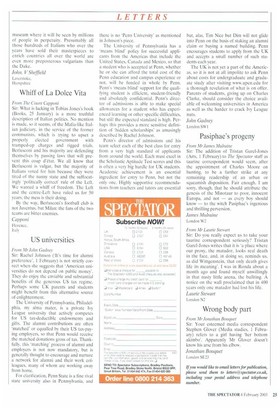US universities
From Mr John Gadney Sir: Rachel Johnson (It's time for alumni preference', I February) is not strictly correct when she suggests that 'American universities do not depend on public money'. They do enjoy the enviable and substantial benefits of the generous US tax regime. Perhaps some UK parents and students might benefit from this alternative source of enlightenment.
The University of Pennsylvania, Philadelphia, my alma mater, is a private Ivy League university that actively competes for US tax-deductible endowments and gifts. The alumni contributions are often `matched' or equalled by their US tax-paying employers, so that Penn would receive the matched donations gross of tax. Thankfully. this 'matching process of alumni and employers is not now mandatory, but is generally thought to encourage and nurture a network for alumni and their work colleagues. many of whom are working away from home.
For clarification, Penn State is a fine rival state university also in Pennsylvania, and there is no Tenn University' as mentioned in Johnson's piece.
The University of Pennsylvania has a `means blind' policy for successful applicants from the Americas that include the United States, Canada and Mexico, so that a student who is accepted at Penn, whether he or she can afford the total cost of the Penn education and campus experience or not, will be funded in whole by Penn. Penn's 'means blind' support for the qualifying student is efficient, student-friendly and absolutely confidential. Penn's director of admissions is able to make special allowances for a student who has experienced learning or other specific difficulties, but still the expected standard is high. Perhaps this provides a more sensitive definition of 'hidden scholarships' as amusingly described by Rachel Johnson.
Penn's director of admissions and his team select each of the best class for entry from a very high standard of applicants from around the world. Each must excel in the Scholastic Aptitude Test scores and this is often a very big hurdle for UK students. Academic achievement is an essential ingredient for entry to Penn, but not the only one. Highly supportive recommendations from teachers and tutors are essential but, alas, Tim Nice but Dim will not glide into Penn on the basis of staking an alumni claim or buying a named building. Penn encourages students to apply from the UK and accepts a small number of such students each year.
The UK is not yet a part of the Americas, so it is not at all impolite to ask Penn about costs for undergraduate and graduate study after visiting www.upen.edu for a thorough revelation of what is on offer. Parents of students, giving up on Charles Clarke, should consider the choice available of welcoming universities in America as well as the harder to crack Ivy League nuts.
John Gadney
London SW I


























































 Previous page
Previous page